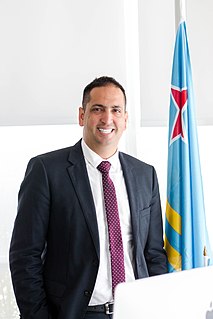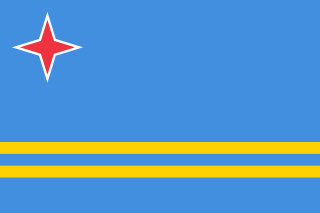Aruba's first inhabitants were the Caquetio Indians from the Arawak tribe, who migrated there from Venezuela to escape attacks by the Caribs. Fragments of the earliest known Indian settlements date back to about 1000. Due to Aruba's mostly distant location from other Caribbean islands and strong currents in the sea which made canoe travel to the other islands difficult, the Caquetios remained more tied to South America than the Caribbean.

Nelson Orlando Oduber was the Prime Minister of Aruba. He was a member of the Movimiento Electoral di Pueblo. He was prime minister for the first time from 1989 until 1994, when his party lost parliamentary elections, and was prime minister again from 2001 until 2009. He led the MEP to victory in the 2001 and 2005 Estates elections, the first consecutive election victories since Aruban status aparte in 1986.

Fredis Jose Refunjol is an Aruban politician and former Governor of Aruba. Originally a teacher, he has served as a government official for the past twenty years, starting as a Member of the Estates of Aruba.
Same-sex marriages are not performed in Aruba, Curaçao, or Sint Maarten, which are constituent countries of the Kingdom of the Netherlands. The islands were, however, obliged after several court rulings to register any marriage registered in the Kingdom, but they don't have to give same-sex marriages the same legal effect as opposite-sex marriages. As marriage in the European territory of the Netherlands, as well as in the Caribbean Netherlands is open to any two people, marriages performed there have to be registered in the islands.
Jossy Mehsen Mansur was the editor of the Papiamento-language newspaper Diario in Aruba. He wrote two dictionaries for the Papiamento language and a history of Aruba among other books.

San Nicolaas is 19 kilometres (12 mi) southeast of Oranjestad, and is Aruba's second largest city. As of 2008 it has a population of 18,126, most of whom originate from the British Caribbean and rest of the Caribbean. It is also home to Aruba's only race track.

Jan Hendrik Albert "Henny" Eman was the first Prime Minister of Aruba from 1 January 1986 to 9 February 1989 and again from 29 July 1994 to 30 October 2001.
The European Parliament election of 1989 in the Netherlands was the election of MEP representing Netherlands constituency for the 1989–1994 term of the European Parliament. It was part of the wider 1989 European election. It was held on 15 June 1989. Ten parties competed in a D'Hondt type election for 25 seats.
Francisco Walfrido "Frido" Croes is an Aruban politician and former schoolteacher who held the office of Minister Plenipotentiary of Aruba from 2005 to 2009.

Michiel Godfried "Mike" Eman is an Aruban politician and the former Prime Minister of Aruba. His political career began in 2001, but Eman has been involved in politics in one way or another since his childhood. His grandfather, father and brother were all prominent politicians in their time, with Henny Eman having preceded him in service (twice) as Prime Minister of Aruba, including as the first to ever hold the office after Aruba's status aparte in January 1986.
The history of the Jews in Aruba can be traced back to the 16th century, when the first Jewish immigrants began to arrive. The first Jews in Aruba were Sephardi Jewish immigrants from Netherlands and Portugal. The first Jew to settle in Aruba was a Portuguese-Jewish worker for the Dutch West Indies Company named Moses Solomon Levie Maduro, who arrived in Aruba with his family in 1754.
Antonito Gordiano "Mito" Croes was an Aruban politician of the Aruban People's Party. He served as Minister Plenipotentiary of Aruba from 1994 to 2001. He previously served as member of the Estates and government minister of the Netherlands Antilles and Aruba.

Evelyna Christina "Evelyn" Wever-Croes is an Aruban politician and current Prime Minister of Aruba, serving since 17 November 2017. She is the first woman to hold this position. She is a member of the People's Electoral Movement (MEP) and has been the leader of the party since 2011.
Juan David Yrausquin is an Aruban politician. He was Minister Plenipotentiary of Aruba between 17 November 2016 and 20 November 2017. He was Minister of Finance between 2013 and 2014 in the second Mike Eman cabinet.
Pauldrick François Teodoric"Paul"Croes is an Aruban politician. A member of the Aruban People's Party, he was a member of the Estates of Aruba between 2009 and 2013, serving as its President from June 2010. He joined the second Mike Eman cabinet as Minister of Social Affairs, Youth and Labor and served between October 2013 and November 2017.
Guillfred Francis Besaril is an Aruban politician of the People's Electoral Movement. He has been Minister Plenipotentiary of Aruba since 20 November 2017. He previously served in the Estates of Aruba between 2013 and November 2017, the last month as President.

Danguillaume Pierino Oduber is the current Minister of Tourism, Public Health and Sport of Aruba. He previously served as a member of the Estates of Aruba from November 2013 until November 17, 2017 when he took up his current role.










